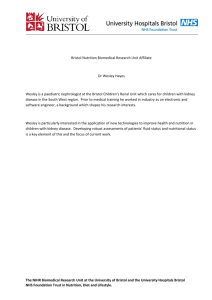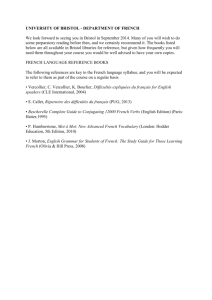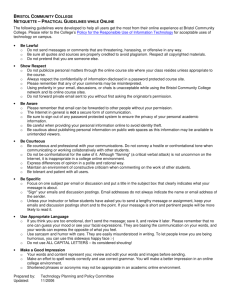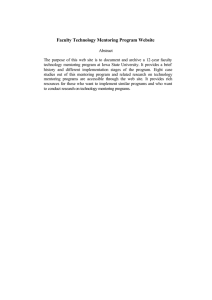Promotion Best Practice
advertisement
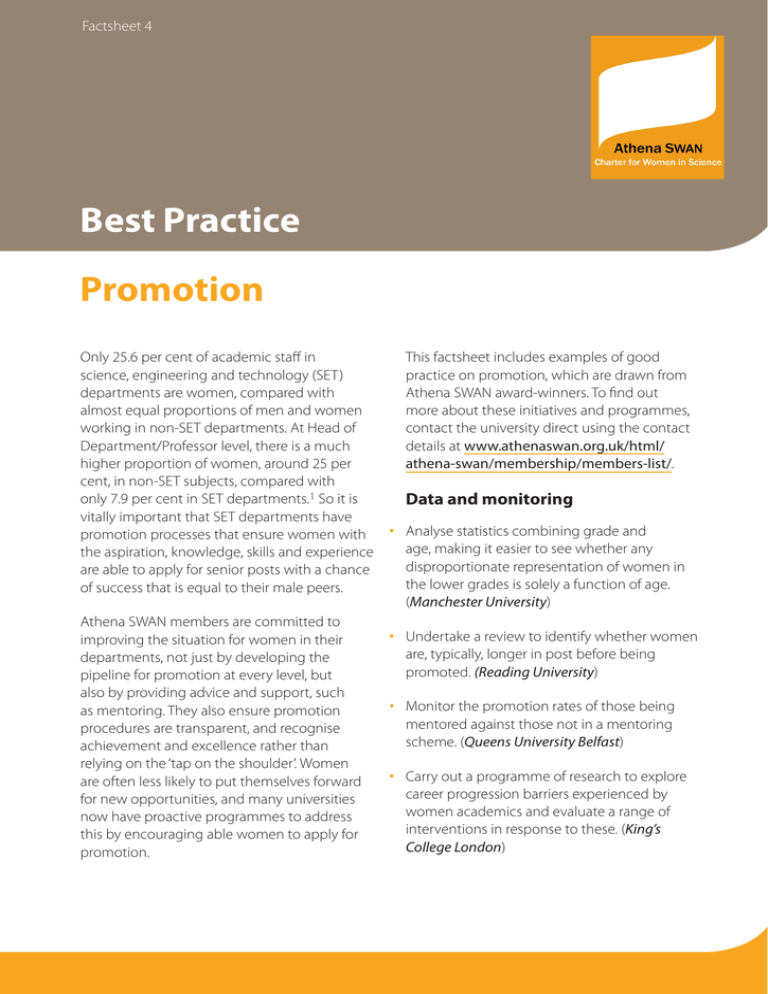
Factsheet 4 Best Practice Promotion Only 25.6 per cent of academic staff in science, engineering and technology (SET) departments are women, compared with almost equal proportions of men and women working in non-SET departments. At Head of Department/Professor level, there is a much higher proportion of women, around 25 per cent, in non-SET subjects, compared with only 7.9 per cent in SET departments.1 So it is vitally important that SET departments have promotion processes that ensure women with the aspiration, knowledge, skills and experience are able to apply for senior posts with a chance of success that is equal to their male peers. Athena SWAN members are committed to improving the situation for women in their departments, not just by developing the pipeline for promotion at every level, but also by providing advice and support, such as mentoring. They also ensure promotion procedures are transparent, and recognise achievement and excellence rather than relying on the ‘tap on the shoulder’. Women are often less likely to put themselves forward for new opportunities, and many universities now have proactive programmes to address this by encouraging able women to apply for promotion. This factsheet includes examples of good practice on promotion, which are drawn from Athena SWAN award-winners. To find out more about these initiatives and programmes, contact the university direct using the contact details at www.athenaswan.org.uk/html/ athena-swan/membership/members-list/. Data and monitoring • Analyse statistics combining grade and age, making it easier to see whether any disproportionate representation of women in the lower grades is solely a function of age. (Manchester University) • Undertake a review to identify whether women are, typically, longer in post before being promoted. (Reading University) • Monitor the promotion rates of those being mentored against those not in a mentoring scheme. (Queens University Belfast) • Carry out a programme of research to explore career progression barriers experienced by women academics and evaluate a range of interventions in response to these. (King’s College London) ve ha epartments ha SET d ve that t s h t n a e v e m t o n t e l a p r p b a a romot ply for e am e d r ep p T a m t r a t d E a e S p e r T r n e c t t E d n a t i S s on p o sh T enio h ie t at r E p e h e t S t p n t t nt av rta m roc r po an tha d ex epartments s ly i oe ess deppoarrttments have p e promhoat SETim sts ha ant SET d mp are able to apply foresxeperiencekiallrseaanble to apply it a l es rom y t ve or t wi for s that lly i rience is v tha nior e, s otaiortments have pro p d rtant is vittiaolnl pro e t a n t p t a t o i n e l a m x p b i t a p i s ly for s . gpo a eanri e e ep n p motio l h v t d l s t ces i e d y T d r c it r s E l k n n i S l e o s e e a c ita enio l o i n pr ills a ens r , roc t s p e ses nt that i e r e t w p . p sw m po r po is v osck ex dg rs ess ur no ly i otrta ale sts ith ls and ew wle es pee .sit ge, esses imp hat e n, k ital rm wi om n, kno ers ts wi e th le d ale skila c tio hei is v tha tally e ns t , i a w t m v e p r i a o t i o t o t s r g ha fs ur t e kn p t e ratioen wit it i rs. ale ual hei le d ew ,n h the as ni c alutcoctess that is eq pee ir m ow on sure om eo aspsure thhae ale u kn ati e r q , o i w m t e en w h n n l p wo omen with t f su ir a ce o o t is ith the as eo the ccess that is equ me ati f success tha pir n wit f su al to h the as ccess that is equ nc ha Review the process by which staff are identified for promotion to ensure it is clear and unbiased, and monitor progression rates. (Reading University) • Ensure there is a critical mass of women in senior jobs as role models for more junior women. (Biochemistry Department, Bristol University) • Include staff on maternity leave in consideration for promotion. (School of Psychology, Nottingham University) • Encourage women to apply for senior management posts by reviewing criteria and support, ensuring core committee experience and addressing the possibility of job-sharing. (Queen’s University Belfast) • Encourage individual departments to review their own promotion system. (Reading University) • Consider alternatives to research as a path to promotion, for example, setting up Teaching Fellowships which would allow Fellows to apply for promotion to Professor level should they acquire an international reputation in their area. (King’s College London) Promotion panels • Require all promotion panels to have a gender balance. (Keele University) • Always have mixed-gender panels, and make every effort to provide external panellists. (Biology Department, York University) • Ensure all panel members receive equality and diversity training, including gender awareness. (Reading University) • • Promotion procedures • Base promotion on excellence rather than length of time in post. (School of Physical and Geographical Sciences, Keele University) • Ensure personnel specifications and job descriptions are not in any way discriminatory. (Queen Mary University of London) • As well as taking into account the quality of candidates, also consider any differing career paths. (Biochemistry Department, Bristol University) www.athenaswan.org.uk nc ha • ac Consider carrying out an online survey to identify any perceived barriers to progression among female staff. (Biochemistry Department, Bristol University) h nc ha • Consider how men and women might be encouraged to apply for posts in areas where they are under-represented. (Leicester University) Operate an accelerated promotion track for ‘rising star’ new appointments and ensure women are encouraged to participate. (School of Psychology, Nottingham University) • Provide feedback for unsuccessful internal candidates. (Leicester University) • Hold an open promotions seminar near the beginning of the academic year to provide a forum for general discussion and queries. Follow this up with individual meetings to assess current readiness for promotion and discuss areas that may need further development to meet the university’s criteria for promotion. (Psychology Department, York University) • • Ask a member of academic staff to speak to each case at the Departmental Promotions Committee, highlighting the strengths and weaknesses of the submission and initiating discussion of the candidate. Provide feedback and one-to-one guidance to the candidate on how to improve their case before submission to the faculty panel. (Bristol University) • Establish a specific team to support professional and leadership development. (Lancaster University) • Advise staff to keep a personal development portfolio and to consider strategies for career progression. (School of Physical and Geographical Sciences, Keele University) Designate champions on the departmental personnel group to provide promotion support for individuals via constructive criticism of draft CVs. (Chemistry Department, York University) • Support junior female academic staff through collaboration on joint research grants and studentships with more senior colleagues. (Chemistry Department, York University) Encouraging and supporting women • Hold meetings between each academic member of the department and the Head and through promotion procedures • Ensure all job adverts are worded in a way that maximises the possibility that women will apply. (Biochemistry Department, Bristol University) • Encourage female applicants by incorporating the Athena SWAN logo into advertisements. (School of Physical and Geographical Sciences, Keele University) • Operate an annual appraisal system that provides staff with dedicated time for discussion of their development needs and career aspirations. (School of Physical and Geographical Sciences, Keele University) • Use the staff review and development process to identify career aspirations of staff and how these might best be met; identify any barriers to career progression and how these might be overcome or worked around. (Biochemistry Department, Bristol University) • Introduce coaching sessions to support each promotions round. (Manchester University) Director of Research to identify barriers/gaps in CVs that could potentially hold up career progression. (Physiology and Pharmacology Department, Bristol University) • Hold regular careers workshops where more senior members of the faculty talk about career pathways and making the transition to academia. (Biochemistry Department, Bristol University) • Encourage female staff to attend universitywide programmes for advancement, networking and development. (Nottingham University) • Offer training to aid career development of potential principal investigators, heads of department and senior managers. (Lancaster University) • Provide peer support for women professors, and create opportunities for them to bring along junior colleagues to network. (Queen’s University Belfast) www.athenaswan.org.uk ac ET departments have prom nce are able to apply t SET departmen t that S for s xperie otio t tha nd e o r ta n eni ts a p n s m l i l p rtan m e t n ible to ap ts have p py ar o a e e r o a k d l r a b l e e r e l T a t po c o s o E e r n p c a a S e n , p i p t r e ces i pelyxpfoer po omo ly fo oim s voiti y im ly im dge exper r se e are able to tTiodnepartments have l l s d r s l e d n l a s t e on n a a t e c a a t s i nn w pply s s s prom pro pro w is vi that SE no nior p for s xperie ior p is v skill otio e, skitllha ces ce portant nd e . it eni rs.itiht ge, te os n, k ng os ir m ses ills a ers led oere ts tio ns led proc k t e lly ismses s a w a s t he , w p t r i i ure kno wi v th ess th le p p o s t l to dgewit sp al e kno a at a , it is a e t at a , l u e w m h n n m h q n s e w s t tio ome entio en ir wi ce o their is e no haira n with th su t he th l to f success that ira sure n, k re aal nto asp t ens an ua asp tio wo u wo q e a q e t he e r h c e i men with t ce ure is men with th e of of success that is al to an success that asp wo equ ce men with the s i t of success tha h ac h h ac ac h • • • Offer regular ‘Making Professor’ workshops to female academics, using female role models and mentors. (Lancaster University) Develop a series of career development workshops specifically for female academics. (Manchester University) Target second-tier managers as well as women professors, and offer them a series of seminars with successful heads of school who maintain high research profiles; career development training; and specialist mentoring by current senior managers at the university or elsewhere. (Queen’s University Belfast) • Encourage internal candidates to apply for vacancies by mentoring them through the process. (Leicester University) • Assign each new academic appointee a mentor from within the academic staff, who can help with initial settling in and provide a longerterm contact for informal advice and support. (Psychology Department, York University) • Run a coaching and mentoring register to embed coaching and mentoring into the university’s performance management system. (Lancaster University) • Institute cross-School mentoring. (Queens University Belfast) • Introduce mentoring circles where groups of four or five staff with a mix of gender and experience regularly meet to discuss aspects of an academic’s tasks and career. (Physiology and Pharmacology Department, Bristol University) www.athenaswan.org.uk Sources of further information • Athena SWAN Charter – a scheme to recognise and share good practice on gender equality in SET in higher education employment (www.athenaswan.org.uk). • Equality Challenge Unit – promotes equality and diversity in higher education, sponsoring research and advice into key issues, including those affecting women (www.ecu.ac.uk). • UK Resource Centre for Women in Science, Engineering and Technology – provides advice, statistics and information about women in SET (www.ukrc4setwomen.org). • Centre for Women Business Leaders at Cranfield University – undertakes research and development programmes to increase the number of women at the top of organisations (www.som.cranfield.ac.uk/som/p1087/ Research/Research-Centres/Centre-forWomen-Business-Leaders). • Opportunity Now – a membership organisation undertaking research and providing support to help employers with gender equality in the workplace (www.opportunitynow.org.uk). 1. Statistics from Equality in Higher Education: Statistical Report 2008. Equality Challenge Unit, London. www.ecu.ac.uk/publications/equality-in-he-stats-08




